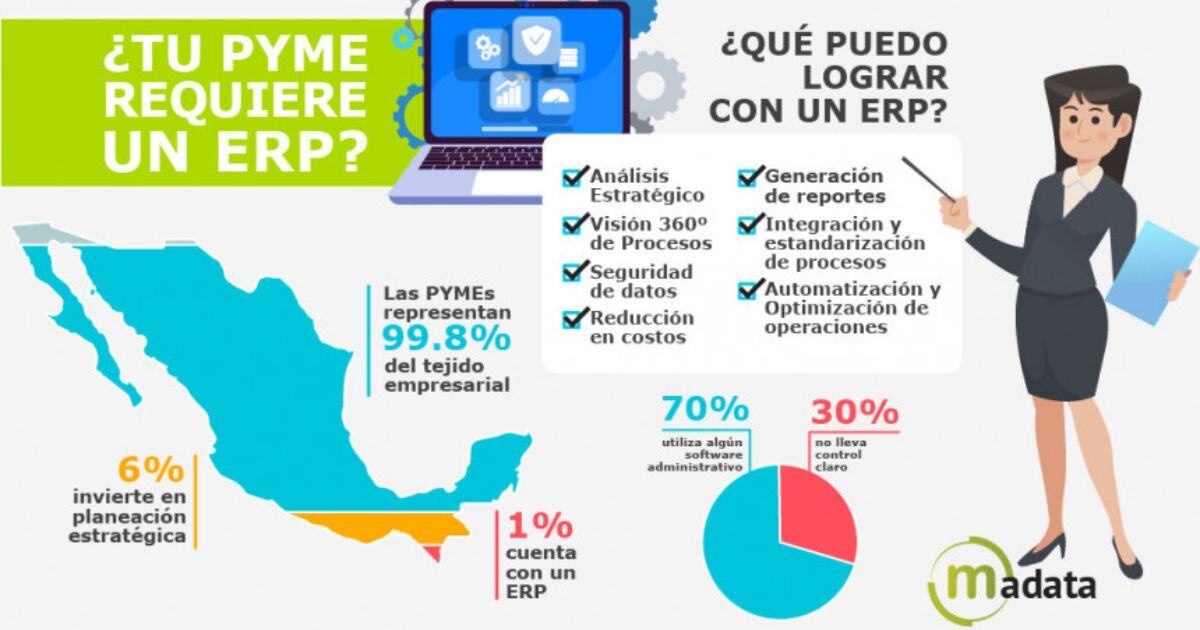Businesses generate vast amounts of data daily, but without the right tools, that data is often wasted. Enterprise Resource Planning (ERP) systems and Business Intelligence (BI) tools help organizations transform raw data into valuable insights. This combination empowers companies to make informed, strategic decisions that drive growth and efficiency.
In this blog, we'll explore the connection between ERP and business intelligence and how they work. We’ll also explain why partnering with MaData ensures you maximize the potential of your ERP system.
The Connection Between ERP Systems and Business Intelligence
ERP systems serve as the central hub for business operations. They collect and manage data from various departments such as finance, supply chain, human resources, and sales. Here's how ERP systems centralize business data:
- ERP systems integrate data from different business functions into a single source of truth.
- They eliminate data silos, ensuring consistency and accuracy across all departments.
- A centralized system improves collaboration, enabling teams to access real-time data without relying on manual reporting.
However, data alone is not enough. This is where BI tools come in. These tools analyze and visualize the data stored within an ERP system. This makes it easier to interpret and use for strategic planning.
- BI tools help process complex datasets and generate reports, dashboards, and forecasts.
- They allow businesses to track key performance indicators (KPIs) and spot trends.
- With advanced analytics, companies can identify inefficiencies and make data-driven decisions to improve operations.
By combining ERP and business intelligence, businesses gain real-time insights that drive strategic decisions and improve overall efficiency.
Drive Better Decisions with ERP-Integrated BI Tools
Having an ERP system alone is not enough to maximize business intelligence. Integrating BI tools enhances the ability to analyze data, providing deeper insights into financial, operational, and strategic areas.
Real-Time Analytics for Faster Insights
Traditional reporting methods can cause delays, forcing businesses to be reactive rather than proactive. ERP-integrated BI tools remove delays by providing real-time visibility into key business metrics. Companies can monitor sales and inventory levels instantly, preventing stock outs or overstocking.
Real-time tracking of employee performance and resource allocation helps businesses optimize productivity and address inefficiencies before they become costly issues. Additionally, these tools identify potential risks, enabling organizations to take corrective action before problems escalate.
ERP-Driven Financial and Operational Decisions
Financial management is one of the biggest areas where BI tools make an impact. With ERP data, companies can gain better visibility into their financial health. This allows them to make informed budget forecasts by analyzing spending patterns and revenue streams. This improved forecasting helps organizations allocate resources more effectively and plan for future growth.
Additionally, ERP-driven insights help businesses identify and eliminate wasteful processes. This reduces operational costs.
Another critical financial advantage of ERP is cash flow monitoring. With real-time data, businesses can track incoming and outgoing funds. This financial oversight prevents bottlenecks and ensures companies have the liquidity needed to sustain operations.
Operationally, ERP-driven BI insights streamline workflows and optimize resource allocation. ERP systems help businesses improve coordination between departments, enhance production planning, and ensure smooth day-to-day operations.
Enhance Forecasting and Resource Planning with ERP Systems
Predicting future business needs is crucial for maintaining efficiency and competitiveness. ERP systems with BI capabilities enhance forecasting and resource planning by providing accurate, data-driven projections.
Predictive Analytics for Smarter Forecasting
ERP systems with predictive analytics help businesses anticipate demand fluctuations and prepare accordingly. Companies that harness these tools can make proactive decisions that improve efficiency and reduce operational risks.
- Inventory Management: Reducing waste by stocking products based on anticipated demand.
- Workforce Planning: Ensuring the right number of employees are available during peak periods.
- Market Trends Analysis: Adjusting business strategies based on shifting consumer behavior.
By leveraging predictive analytics, organizations can improve forecasting accuracy, minimize resource waste, and stay ahead of industry trends.
Optimize Resource Allocation
Effective resource management is critical for business success, and ERP systems provide the tools needed to maximize efficiency. Here's how an ERP can optimize resource allocation:
- ERP data provides visibility into asset utilization, helping companies allocate resources efficiently.
- Businesses can identify underperforming areas and reassign resources to maximize productivity.
- Automation features in ERP systems streamline scheduling, ensuring optimal workforce management.
By leveraging these insights, companies can make data-backed decisions that improve efficiency and reduce costs.
Real-World Examples of Smarter Decision-Making with ERP Systems
Many organizations have transformed their business operations by implementing ERP and BI solutions. Below are real-world examples of how companies across different industries leverage these systems to improve decision-making.
Financial Institutions Managing Budgets
Banks and financial institutions rely on ERP-driven BI tools to gain a clear view of their financial health. By analyzing transaction data and operational expenses, they can identify spending patterns and reduce unnecessary costs. This visibility allows financial institutions to optimize budgeting, allocate resources more effectively, and improve overall financial stability.
ERP systems also enhance credit risk assessments by leveraging historical financial data to determine lending risks. Another key advantage is compliance. ERP systems automate reporting processes to help banks meet regulatory requirements.
Manufacturers Improving Supply Chain Visibility
Manufacturing companies use ERP-integrated BI tools to track supply chain performance and optimize logistics. With real-time data, manufacturers can monitor supplier reliability and anticipate production delays before they become costly disruptions. These insights help businesses adjust procurement strategies, ensuring materials arrive on time to maintain production schedules.
Additionally, ERP-driven analytics allow manufacturers to analyze transportation costs and delivery times.
Retailers Enhancing Customer Data Analysis
Retailers depend on ERP and BI to analyze consumer behavior and personalize marketing strategies. By leveraging sales data, retailers can offer personalized promotions based on purchasing trends. This creates a more engaging shopping experience for customers.
Store layout optimization is another benefit. ERP systems analyze foot traffic patterns to determine the most effective product placements, maximizing sales potential. Demand forecasting becomes more precise, helping retailers avoid overstocking or running out of stock. These capabilities help retailers improve customer satisfaction and drive increased revenue.
 How MaData Helps Businesses Maximize ERP and BI Potential
How MaData Helps Businesses Maximize ERP and BI Potential
At MaData, we specialize in helping businesses unlock the full potential of ERP and BI systems. Our expertise in ERP integration, customization, and support ensures that your business leverages these tools effectively.
Custom ERP Implementation and BI Integration
At MaData, we tailor ERP solutions to fit the specific needs of your industry and business model. Our team works closely with you to ensure seamless integration with BI tools so you can use the tools effectively.
We customize ERP features to align with your company's operational goals. We also make sure the system is user-friendly and optimized for performance.
Advanced Analytics and Training Support
Having a robust ERP and BI system is only valuable if your team can use it effectively. At MaData, we offer hands-on training sessions to ensure employees understand how to maximize the system’s functionality. Our ongoing technical support helps troubleshoot any issues, allowing for smooth and uninterrupted operations.
We continuously upgrade and improve ERP systems to align them with evolving business needs.
Long-Term Success Through Data-Driven Strategies
At MaData, our commitment to clients goes beyond the initial implementation phase. We conduct regular system audits that refine business processes and enhance efficiency. Our data-driven strategy development helps organizations optimize operational performance by leveraging real-time insights and analytics.
Additionally, our expert guidance ensures that companies stay ahead of industry trends and innovations.
Unlock the Full Potential of ERP and BI with MaData
Integrating ERP and business intelligence tools is no longer optional. It’s essential for businesses that want to remain competitive. By leveraging these tools, companies can improve efficiency, reduce costs, and drive innovation.
At MaData, we help businesses navigate the complexities of ERP and BI, ensuring seamless implementation and maximum value. Download our guide, “The Ultimate Guide to ERP Implementation: A Step-by-Step Approach,” to learn more about ERP systems.








